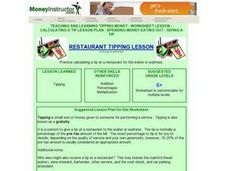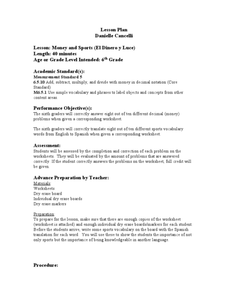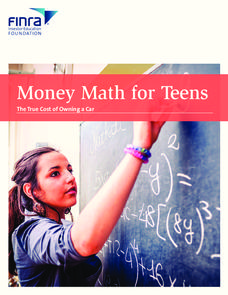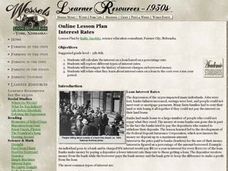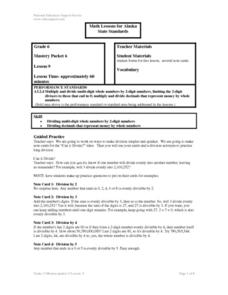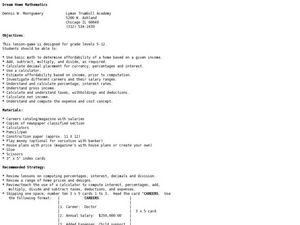Curated OER
Restaurant Tipping Lesson
What do you do after a good meal, tip the server of course. The class calculates the appropriate tip to leave at a restaurant given certain bills. They identify the bill before and after tax and find the correct tip. A great way to put...
Curated OER
Paws in Jobland Number Crunch
Learners analyze real life jobs that involve math. They discuss jobs where math is used, and explore how math is important in many areas and research some of these jobs in the book "Paws in Jobland." They complete a worksheet with four...
Curated OER
Problem Solving Using Coin Identity and Coin Value
Students identify characteristics of a penny, nickel, dime, and quarter, match the value of coins, and practice using money for a purchase.
Curated OER
On the Road Again
Students work with patterns to develop formulas that will help them determine total cost. In this patterning lesson, students watch a video about an NBA trainer. (not included) They work in groups to access the assigned Internet websites...
Curated OER
Money Percentages Matching
Pupils practice identifying coins and their respective percentage.
Curated OER
Number and Operations- Using Gift Certificates
Students apply number and operation skills to learn how to spend a gift certificate. In this mathematical reasoning lesson, students use base 10 blocks as money and calculate how much money they have.
Curated OER
Math & Science
Students are introduced to techniques to help with with math and science. In groups, they use a worksheet to discover how to count money. As a class, they watch a PowerPoint to define terms associated with science. To end the lesson,...
Curated OER
Clothing Store Word Problems
Students practice answering money word problems on shopping at the clothing store.
Curated OER
Money and Sports
Sixth graders translate sports vocabulary words from English to Spanish and complete money problems containing decimals. In this money and sports lesson plan, 6th graders use words to communicate to each other.
Curated OER
Subtracting Integers with Counters
Young scholars subtract integers using counters. In this algebra lesson, students solve linear equations using an online tool. They use subtraction to isolate the variable.
Curated OER
Money Skills (Using Coins)
Students pretend to purchase items at their class store using coins. At the store, they are to state the amount of the item they want to buy by reading the label. They give the cashier the correct amount of coins and are given a mark on...
SaveandInvest.org
The True Cost of Owning a Car
Almost every teen wants a car, but can they really afford one? The lesson walks pupils through how to identify a budget, find all of the costs associated with car ownership, and determine if they should buy the car or keep looking.
Curated OER
Using Counting-on Strategy for Purchasing
Intended for learners with autism and developmental disabilities, this lesson uses the strategy of counting-on to enhance independent shopping skills. Learners will practice counting on to the next dollar value in order to purchase items...
Curated OER
Budget Making
Students develop a budget for spending and saving. In this economics lesson, students create a budget based on personal, family and government income. They discuss jobs at home and allowances. They discuss how they manage their money...
Curated OER
Interest Rates
Use a KWL chart and discussion to explore the concept behind loans with interest based on percentage rates. Learners examine different types of interest, the history of interest loans and calculate the costs of a loan over a ten-year...
Curated OER
Introduction to the National Debt
Students relate the national debt to the economy. In this algebra lesson, students discuss what the national debt is, create a national budget based on priority and what the government should spend money on. They analyze their findings...
Council for Economic Education
Calculating Simple Interest
How much is owed? A calculated resource introduces the simple interest formula with a video that describes how to use it. Classmates then show what they know by answering questions within a simple interest worksheet.
Curated OER
Econ in a Bag
Here is a nice idea, have your young entrepeneurs form their own companies. Each company is given a paper bad to locate and place resources in that they can use to create products their businesses sell on Sale Day. They identify and...
Curated OER
Does My hair Disrupt Your Learning?
Students use the internet to research ways to save and earn money. They interview bankers and financial counselors to discover different types of investments. Students create public service announcements to inform their classmates of...
Curated OER
Money Management Part III: Savings Accounts and Cash vs. Credit
Help your class understand the importance of saving and managing their money. Here is part three to a unit on credit, cash, and savings. Learners discuss savings accounts and the idea that a budget plan can help them avoid costly credit...
Actis
Handling Data: Probability, Tree Diagrams
Clean, but captivating, two online simulations demonstrate probability for middle schoolers. They can choose the number of coins and tosses and watch as the results pile up. They can choose from a variety of spinner types and the number...
Curated OER
A Lifetime of Savings
Sometimes people who seem to lead what would be considered an ordinary life do extraordinary things. Such was the case with Oseola McCarty, who donated a large sum of money for a university scholarship fund in her name. Oseala lived her...
National Education Support Service
Division Note Cards
Sixth graders create note cards to divide multi-digit whole numbers by two-digit numbers and divide decimals that represent money by whole numbers in a simpler and faster fashion. They write the rules and examples of each on the cards...
Curated OER
Dream Home Mathematics
Explore the concept of budgeting with sixth graders. They will pick a career on note card made by the teacher. They then use the information on the card such as salary, expenses, and career to create a life for themselves. They also...


